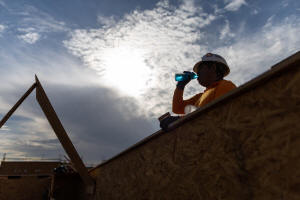Extreme heat cuts into US small business, worker hours in July, report
shows
 Send a link to a friend
Send a link to a friend
 [August 02, 2023]
By Safiyah Riddle [August 02, 2023]
By Safiyah Riddle
(Reuters) - Record-breaking heat waves across the U.S. forced small
businesses to close early in July, according to a report released on
Tuesday, and reduced paid working hours for employees as dangerous
temperatures reshape consumer behavior.
Hundreds of millions Americans dealt with extreme heat advisories in the
past two weeks, as temperatures across the South and Southwest hit
historic highs. These hazardous conditions have kept consumers inside
and forced small businesses to close early - cutting into paid hours for
employees - according to a report by the small business payroll company
Homebase.
Nationally, small business employees worked 0.9% fewer hours in the
first two weeks of July compared with the last two weeks of June - a
standard seasonal change that is typical of summer months - the report
said. But slowdowns were up to five-and-a-half times higher in cities
that experienced the worst of the heat wave, highlighting the impact of
high temperatures on local economies.

Small business employees in New Orleans and Memphis, for example, were
on the clock 5.7% and 5.1% less, respectively, than they were in June as
business owners shorten hours to adjust for fewer customers and try to
protect employees from too much heat exposure. Memphis clocked 11 days
with temperatures at 90 degrees Fahrenheit (32 degrees Celsius) or above
in July, while New Orleans recorded 26 days in the 90s.
By contrast, businesses in cities that experienced shorter heat waves
were able to increase hours of operation and the number of employees
working: Boston - with just two days in the 90s - saw the largest
month-to-month increase in the number of hours worked by employees at
7.8%.

"Main Street is feeling the heat. It may just be too hot for customers
and businesses alike," said Homebase CEO John Waldmann.
[to top of second column]
|

A construction worker drink a cold
beverage during a heat wave where temperatures rise over 110 degrees
Fahrenheit for 27 consecutive days, in Scottsdale, at the Phoenix
metro area, Arizona, U.S., July 28, 2023. REUTERS/Carlos Barria

Danah Lee saw it firsthand as an employee at Willie's Taco Joint in
Phoenix - where earlier in July the National Weather Service
recorded the longest consecutive streak of temperatures over 110
degrees Fahrenheit in history. Lee said there has been a significant
decrease in foot traffic and the indoor dining areas consistently
reach 95 degrees or above, despite the restaurant's best efforts to
keep things cool.
"Not only is it affecting our business, but it's affecting my team.
Working long hours in this heat is very hard. I've had to have more
people on my schedule, working shorter shifts to make sure we have
no heat exhaustion," said Lee.
Some employers in labor intensive outdoor industries are electing to
shift workers' hours earlier in the day while temperatures are
relatively lower rather than cutting them altogether, according to
Travis Parsons, director of occupational safety and health for
Laborers International Union of North America, which represents half
a million builders and construction workers across the U.S. and
Canada.
But Parsons said the lack of federal oversight meant that
contractors were not obliged to make these accommodations in some
states, leaving workers vulnerable to heat-related injuries.
"It's more relevant now than ever. It's always been an issue in my
20 plus years, but it seems to be really in the spotlight," said
Parsons. "It's very concerning."
(Reporting by Safiyah Riddle; Editing by Dan Burns)
[© 2023 Thomson Reuters. All rights
reserved.]This material may not be published,
broadcast, rewritten or redistributed.
Thompson Reuters is solely responsible for this content.
 |